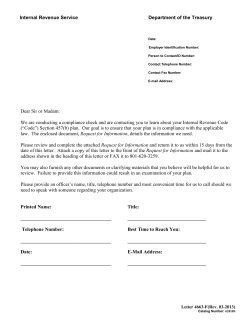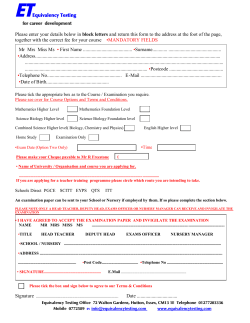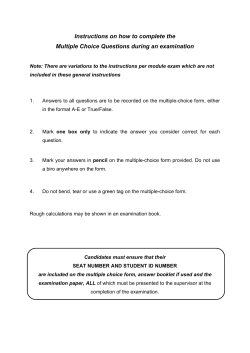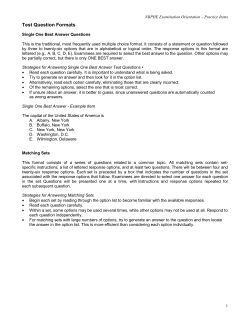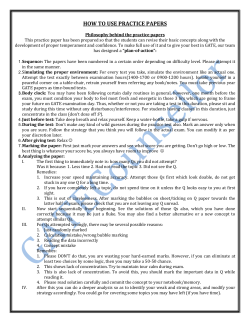
SAMPLE EXAMINATION
SAMPLE EXAMINATION The purpose of the following sample examination is to provide an example of what is provided on exam day by ASQ, complete with the same instructions that are provided on exam day. The test questions that appear in this sample examination are retired from the CQE pool and have appeared in past CQE examinations. Since they are now available to the public, they will NOT appear in future CQE examinations. This sample examination WILL NOT be allowed into the exam room. Appendix A contains the answers to the sample test questions. ASQ will not provide scoring and analysis for this sample examination. Remember: These test questions will not appear on future examinations so your performance on this sample examination may not reflect how you perform on the formal examination. A self-appraisal of how well you know the content for the specific areas of the body of knowledge (BOK) can be completed by using the worksheet in Appendix B. On page 2 of the instructions, it states “There are 160 questions on this 5-hour examination.” Please note that this sample exam only contains 75 questions. If you have any questions regarding this sample examination, please email cert@asq.org © 2011 ASQ ASQ grants permission for individuals to use this sample examination as a means to prepare for the formal examination. This examination may be printed, reproduced and used for non-commercial, personal or educational purposes only, provided that (i) the examination is not modified, and (ii) ASQ’s copyright notice is included. The user assumes all risks of copyright infringement. THIS PAGE IS LEFT BLANK INTENTIONALLY. NAME____________________________________ CERTIFIED QUALITY ENGINEER Please print your name above. Read all the instructions before beginning the examination. If you are unsure about any part of the instructions, consult your proctor. In order for ASQ to be able to properly scan the Scantron answer sheet, you must completely fill in the circle. Each circle must be filled in dark enough for the scanner to properly pick up the answer you chose. If not, this could result in the exam not being scored correctly, or potentially delay your results. General Instructions All answers must be recorded on the Scantron Answer Sheet; no exam will be graded with the answers marked in the exam booklet. 1. Using a soft lead pencil (#2 or softer) only, blacken the circle of the correct answer. Do not use ink. If you change your answer, be sure to erase the previous answer completely. 2. Each question has ONE correct answer only. 3. This is a timed test; do not linger over difficult questions. Instead, skip the questions of which you are unsure; return to them when you reach the end of the test. 4. Do not fold, staple, or tear the answer sheets. 5. Although this is an open book examination and personally generated materials/notes from training or refresher courses are allowed, the following conditions apply: • • • Each examinee must make his/her reference materials available to the proctor for review. Absolutely no collections of questions and answers or weekly refresher course quizzes are permitted. Reference sources that contain such copy are not allowed unless the questions and answers are removed or obscured. Examples of such sources include but are not limited to refresher and preparatory primers. Calculator Policy: With the introduction of palmtop computers and increasing sophistication of scientific calculators, ASQ has become increasingly aware of the need to limit the types of calculators that are permitted for use during the examinations. Any silent, hand-held, battery-operated calculator WITHOUT an alphabetic keyboard will be permitted; however, all programmable memory must be cleared from the calculator before you enter the exam room. The examination is written so that a simple calculator will be sufficient to perform calculations. No laptop or palmtop computers are allowed. • No Cell Phones are allowed in exam room • Reference materials and calculators may not be shared. • 6. When you have finished, check your answer sheet to be sure it is properly identified with your name and member number. Return your examination booklet, answer sheet, examinee comment form and scratch paper to your proctor. You must sign the roster sheet to signify the return of your test booklet. 7. It is strictly forbidden to copy or remove examination materials. You will be disqualified from the examination and not certified by ASQ if you breach this trust. 8. PLEASE BE PATIENT - you will receive your results in approximately two weeks. Sorry, but we do not answer telephone requests for results. If you pass, your certificate will be sent directly to your address of record. If you do not pass, you will receive a Pareto analysis of your test results along with retake information. CQE Sample Exam Special Instructions 1. Please note that your answer sheet has been personalized with your name, member number, section number, and test type. 2. Do NOT make any changes to these parts of the answer sheet. Doing so will only delay your exam results. Notify the Proctor of any changes. 3. If you don’t have a personalized answer sheet, see your Proctor for further instructions. 4. There are 160 questions on this 5-hour examination. Please check that you have the correct number of questions. STOP DO NOT CONTINUE UNTIL INSTRUCTED CQE-SAMPLE EXAM CERTIFIED QUALITY ENGINEER Test Directions: Each of the questions or incomplete statements below is followed by four suggested answers or completions. Select the one that is best in each case and then fill in the corresponding space on the answer sheet. 5. Which of the following is a barrier to the successful performance of a quality team? 1. A correlation table yields results similar to those of a (A) check sheet (B) control chart (C) Pareto diagram (D) scatter diagram (A) Rating the performance of each team member (B) Including people with abilities in different areas (C) Including people from different departments (D) Having the team make decisions without management approval 2. Which of the following is a typical obstacle to design review? 6. A company incurred the following quality costs in the last month. (A) Customer requirements (B) Manufacturing requirements (C) Resistance from the design department (D) Safety regulations Evaluating finished product $50,000 Quality auditor training $10,000 Manufacturability study $1,000 Repairing finished product $5,000 Process capability studies $30,000 3. Implementing a preventive quality system will increase which of the following? How much did the company spend on prevention costs? (A) Failure costs (B) Inspection time (C) Quality system effectiveness (D) Corrective action effectiveness (A) $11,000 (B) $41,000 (C) $46,000 (D) $96,000 4. Which of the following inspection methods can be used to detect surface flaws but not subsurface flaws? 7. Which of the following methods is used to determine whether a process functions properly for its intended use? (A) Liquid penetrant (B) Ultrasonic (C) Radiographic (D) Magnetic particle (A) Capacity (B) Inspection (C) Validation (D) Design review 3 CQE-SAMPLE EXAM 11. Given identical specification limits, which of the following process distributions has the highest Cp value? 8. One purpose of a failure mode and effects analysis (FMEA) is to (A) validate that the design meets the intended purpose (B) estimate the feasibility of a manufacturing process (C) anticipate and reduce the probability of product failures (D) perform root cause analysis along with corrective action (A) LSL USL (B) LSL USL 9. When common causes of variation are treated as special causes of variation, the usual result is (A) failure to take timely corrective action (B) failure to perform root cause analysis (C) misclassification of in-specification product (D) over-adjustment of the process 10. Root causes are investigated as part of which of the following processes? (A) Corrective action (B) Process mapping (C) Inspection (D) Auditing (C) (D) LSL LSL USL USL _______________________________________ 4 CQE-SAMPLE EXAM 12. According to ISO 9000 standards, quality records must be Questions 14 − 16 refer to the following information. (A) written and illustrated clearly and concisely (B) maintained in electronic form (C) legible, identifiable, and retrievable (D) standardized and documented A supplier has a contract with a customer that requires semiannual, destructive testing of sample products. According to the contract, test results must be submitted to the customer to retain qualified supplier status, and the supplier must notify the customer when any of the samples fail testing. 13. The ability to preserve the identity of a product and its origins is called During a test cycle, some of the products fail, and the quality manager directs the quality engineer to reduce the number of samples tested by the number that failed so that the records will show that all samples passed the tests. The quality engineer documents the manager’s orders, changes the test records, and ships the product. A short time later, both the quality engineer and the quality manager are laid off during a reorganization. (A) production control (B) traceability (C) bar coding (D) sequencing Upper management subsequently hires a new quality engineer and contracts with an outside audit company to conduct an audit. In preparing for the audit, the new quality engineer discovers the falsified records. 14. What immediate action should the first quality engineer have taken after documenting the test failures? (A) Placed all products on hold (B) Had the test repeated by an external testing laboratory (C) Negotiated a revised specification with the customer (D) Retrained the employees who tested the products 15. How should the first quality engineer have responded to the quality manager’s order? (A) Carried out the directive exactly as ordered (B) Instructed someone else to perform the task (C) Advised the manager of their potential adverse consequences (D) Notified the customer anonymously 16. With respect to the falsified records, the new quality engineer is responsible for (A) documenting as historical any events that took place prior to being hired at this company (B) documenting the impact those records will have on future product (C) notifying management and recommending that the customer be contacted promptly (D) re-running the tests to see whether similar failures occur _______________________________________ 5 CQE-SAMPLE EXAM 22. The following information was developed by a quality engineer. 17. The revision table of a drawing should contain which of the following information? (A) The quality manager’s signature of approval (B) The date of the revision (C) The GD&T reference standard used (D) The drawing standard used 50 50 50 50 i =1 i =1 i =1 i =1 ∑ x i = 750, ∑ y i = 875, ∑ x i y i = 22,150, ∑ x i2 = 20,500 Which of the following equations should the engineer use to estimate the regression line? 18. Which of the following control charts tracks nonconformities by attributes per unit and uses a constant sample size for each subgroup? yˆ (B) yˆ (C) yˆ (D) yˆ (A) (A) np (B) c (C) p (D) u = 2.8650 + 0.9757x = 0.9757 + 2.8650x = 7.3510 + 0.6766x = 0.6766 + 7.3510x 23. Which of the following formulas is used to calculate the sample variance? 19. Which of the following methods can be used to determine whether only materials and components of known quality were used in the final product? (A) Prevention (B) Reliability (C) Warranty analysis (D) Traceability (A) ∑ (X i − X ) n (B) ∑ (X i − X ) n −1 ∑ (X i − X ) n ∑ (X i − X )2 n −1 (C) 20. A bowl contains 312 marbles: six red, seven green, eight blue, and the rest yellow. Three draws are taken with replacement. What is the probability of getting a red marble on the first draw, a blue marble on the second draw, and a blue marble on the last draw? (D) 2 24. Which of the following is most likely to be a goal for quality engineering? (A) 0.00001 (B) 0.00962 (C) 0.07051 (D) 0.99038 (A) Maintaining a minimum variance on the cost of raw materials (B) Establishing an allowance for defects or nonconformities in supplied product (C) Establishing a quality appraisal system for products (D) Developing acceptable lead times for product delivery 21. Which of the following sets of elements identifies the major classifications used in a cost of quality system? (A) Training, internal failure, delayed delivery (B) Prevention, appraisal, failure (C) Auditing, external failure, rework (D) Appraisal, warranty, failure 6 CQE-SAMPLE EXAM 25. A component failed 5 times during a 360-hour test and the failures follow an exponential distribution. In this situation, what is the estimated MTBF in hours? 29. Variables data can best be described as data that are (A) presented on a nominal measurement scale (B) indicated by discrete counts (C) limited by the precision of the measuring device (D) recorded as pass/fail (A) 0.014 (B) 72.000 (C) 500.000 (D) 1,800.000 30. A continuous improvement team uses the following steps at each of its weekly meetings. 26. Which of the following techniques is used to qualify new or revised manufacturing processes? 1. Amend the agenda as necessary 2. Summarize the action items from the current meeting 3. Plan for the next meeting 4. Review the agenda (A) Benchmarking (B) Capability analysis (C) Design failure mode and effects analysis (DFMEA) (D) Fault tree analysis Rank order, from first to last, the sequence in which these steps should be completed. 27. If the true value of a standard is 0.050, which of the following sets of data is the best example of accuracy, rather than precision? (A) 1, 2, 3, 4 (B) 1, 3, 4, 2 (C) 4, 1, 2, 3 (D) 4, 2, 3, 1 (A) 0.048, 0.051, 0.052, 0.049 (B) 0.050, 0.047, 0.048, 0.051 (C) 0.050, 0.047, 0.050, 0.050 (D) 0.050, 0.053, 0.049, 0.053 31. A customer requires a Cp ≥ 1.33 for a specification of 15.5 ± 2.0. If the supplier’s process has a mean of 15.0 and a standard deviation of 0.5, which of the following describes the process capability? 28. A standard with a known value of 10.200 mm is measured 8 times with a micrometer that has a resolution of 0.001 mm. The readings of these measurements are presented in the following table. 10.208 10.204 10.197 10.212 10.216 10.196 10.206 10.202 (A) (B) (C) (D) On the basis of this information, what is the bias of the measurement system? (A) 0.002 mm (B) 0.005 mm (C) 10.200 mm (D) 10.205 mm 7 Process Cp Product Requirements Acceptable Acceptable Not acceptable Not acceptable Meets specifications Does not meet specifications Meets specifications Does not meet specifications CQE-SAMPLE EXAM Questions 35 − 37 refer to the following information. 32. Which of the following steps is most important after a customer has qualified a new supplier? Soft drinks manufacturers received complaints from consumers about the high pressure that built up when two-liter plastic bottles were shaken. An industry task force determined that the bottle threads should be redesigned to safely vent the bottle during opening. A new design was submitted for review and testing on a soft drink with especially high pressure potentials, and only maximum pressures were to be analyzed during the experiment. Because of disagreement on maximum exposure temperatures, the team decided to test the product at 90 °F, 120 °F, and 140 °F. The bottles were to be filled at three different bottling lines to examine the effects of different carbonation methods and capping operations. (A) Tour the supplier’s manufacturing facilities (B) Check the supplier’s reputation (C) Evaluate similar products (D) Establish a good working relationship 33. Which of the following audit strategies requires the auditor to follow the production flow? (A) Element (B) Department (C) Discovery (D) Tracing 35. Which of the following steps should be taken if one bottling line is found to produce a main effect but filling temperature has no effect? 34. What is the availability of a system that has a mean time between failures (MTBF) equal to 2,500 hours and a mean time to repair (MTTR) equal to 98.0 hours? (A) Repeat the experiment on the same bottling line (B) Conduct an analysis of variance study of the temperature treatments (C) Investigate bottling line differences (D) Determine the interaction effects between bottling lines (A) 0.0377 (B) 0.9608 (C) 0.9623 (D) 1.0390 36. Which of the following best describes the industry’s decision to form a task force to redesign the bottle threads? (A) Process reengineering (B) Corrective action (C) Quality function deployment (D) Force field analysis 37. Which of the following experimental design types would be most appropriate for identifying the bottle thread design? (A) Factorial (B) Youden square (C) Graeco-Latin square (D) Mixture _________________________________________ 8 CQE-SAMPLE EXAM 42. The following table was developed by a team. 38. Which of the following actions is most important in the design of a total quality system? x 10 12 14 16 (A) Viewing major activities as production steps for the next internal customer (B) Understanding the requirements of interim- and endusers (C) Assessing warranty costs as external failures (D) Using an activity-based costing (ABC) system P(x) 0.1 0.2 0.3 0.4 1.0 What is the expected value of the random variable x? 39. The overall reliability of a process has a mean time between failures (MTBF) of 16.5 hours. If the failures follow an exponential distribution and the total run time is 30 hours, what is the process reliability? (A) 12.5 (B) 13.0 (C) 13.5 (D) 14.0 (A) 0.1623 (B) 0.5500 (C) 0.5769 (D) 0.8377 43. Which of the following tools has the highest resolution? (A) A steel ruler (B) Ground flat stock (C) A caliper (D) A micrometer 40. Rank order, from first to last, the following steps in creating a check sheet. 1. Define the time frame for collecting the data 2. Clarify the events or conditions to observe and count 3. Design a check sheet that is easy to use 44. Which of the following sets of actions is key to helping teams be effective? (A) Using facilitators, managing conflict, and encouraging participation by team members (B) Using the forming, storming, norming, and performing cycle on team projects (C) Identifying which team projects can benefit most from the plan, do, check, act method (D) Identifying root causes, corrective and preventive actions, and follow-up techniques on team projects (A) 1, 2, 3 (B) 1, 3, 2 (C) 2, 1, 3 (D) 2, 3, 1 41. A double sampling plan from the ANSI/ASQ Z1.4 standard has the following additional details. 45. The following data plot was created from a product sample. Lot size = 100 AQL = 4.0 Normal general inspection level II 3 4 5 6 If one defect is found in the first sample, which of the following would be the next step? (A) Return the defect to the supplier and accept the lot (B) Reject the lot (C) Draw a second sample and reject the lot if one defect is found in that sample (D) Draw a second sample and reject the lot if 4 defects are found in that sample 6 4 6 8 8 8 0 1 1 2 3 4 7 1 3 4 What is the median value of this data set? (A) 48 (B) 51 (C) 51.5 (D) 53.5 9 CQE-SAMPLE EXAM 46. A sample of 50 pieces is taken from a process that is known to be producing 0.2% nonconforming pieces. The probability that nonconforming pieces will not be found in the sample is approximately equal to 50. The parts in the following assembly (X) are all fully interchangeable. X (A) 0.09 (B) 0.36 (C) 0.64 (D) 0.91 X1 0.750 ± 0.002 47. Which of the following actions will reduce the effectiveness of a training program in SPC? X2 X3 1.000 ± 0.005 1.500 ± 0.003 X4 0.250 ± 0.001 Using worst-case tolerancing, what are the minimum and maximum dimensions for X? (A) Applying the principles immediately after training (B) Involving line managers in the planning (C) Using a lecture approach (D) Using simple language and graphical techniques Minimum (A) (B) (C) (D) 48. Which of the following tools is most effective for facilitating the discussion of controversial topics? 3.489 3.494 3.496 3.499 Maximum 3.511 3.506 3.504 3.511 51. The appropriate number of histogram classes for n = 100 observations is (A) Activity network diagrams (B) Nominal group technique (C) Consensus criteria method (D) Matrix method (A) 1-5 (B) 6-10 (C) 15-20 (D) 21-30 49. A completed failure mode and effects analysis (FMEA) results in the following assessment rating. 52. What is the first step that a sponsor should take before forming a quality team? Occurrence = 4 Severity = 8 Detection = 10 (A) Select a project (B) Establish performance measures (C) Identify project milestones (D) Allocate capital resources What is the risk priority number (RPN) for this FMEA? (A) 22 (B) 42 (C) 120 (D) 320 53. A sample of 30 tubes has a mean length of 23.8 cm and an estimated standard deviation of 2.6 cm. What are the 95% confidence limits of the mean? (A) 22.54 cm and 25.06 cm (B) 22.83 cm and 24.77 cm (C) 22.99 cm and 24.61 cm (D) 23.18 cm and 24.42 cm 10 CQE-SAMPLE EXAM 59. An acceptable quality information system (QIS) should be 54. In a complex electronic system containing 1,000 devices in series, an increase in component reliability from 99.90% to 99.99% would improve the system reliability by a factor of approximately (A) excluded from the audit program (B) developed by the quality department (C) designed so that all available data are collected (D) designed to be flexible and capture a wide variety of data (A) 2.5 (B) 3.7 (C) 5.0 (D) 7.5 60. Which of the following areas of a corrective action request is an auditee required to complete? 55. Which of the following tools will provide quantitative results? (A) Location of the problem (B) Observation of the problem (C) Actions to prevent recurrence (D) Verification of follow-up activities (A) Affinity diagram (B) Cause and effect diagram (C) Prioritization matrix (D) Force field analysis 61. A process with a binomial distribution has a 5% probability of success. If 10 samples are drawn from the process, what is the approximate probability of having zero success? 56. A data set for a measured characteristic of a part has a standard deviation of 11.2. If the standard deviation of the measurement error is 2.1, what is the estimated true standard deviation for the characteristic? (A) 0.5 (B) 0.6 (C) 0.7 (D) 0.8 (A) 9.1 (B) 11.0 (C) 11.8 (D) 13.3 62. Which of the following elements is most often lacking in corrective action plans? 57. Which of the following tools should a team use to help develop contingency plans in response to an emergency situation? (A) Timely response (B) Follow-up (C) Re-training (D) Closing the audit (A) Process decision program charts (B) A fault tree diagram (C) A matrix diagram (D) Process value chain maps 63. Which of the following theorists suggests that a reduction in variation of a product or process represents a “lower loss” to society? 58. The primary reason for segregating nonconforming material is to (A) Juran (B) Deming (C) Taguchi (D) Ishikawa (A) minimize the likelihood of additional damage to the material (B) allow for rework of the material that cannot be easily done on the production line (C) ensure accurate counts for inventory of the material (D) reduce the opportunity of using the material in production 11 CQE-SAMPLE EXAM 64. A process is in statistical control, is centered on target, and has a ± 4σ spread equal to the specification range. This process can best be described as having a 67. The following charts represent correlation studies for three sets of data: X, Y, and Z. (A) Cp of 1.00 (B) Cpk of 1.33 (C) Cpk of 1.66 (D) Cr of 0.60 65. A series system contains three subsystems with the following distributions. Subsystem Distribution 1 Exponential life; MTBF = 10,000 hours 2 Weibull distribution; θ = 12,000 hours β = 0.42 3 Exponential life; MTBF = 25,000 hours X If the system is operated for 5,000 hours, what is its reliability? (A) 0.249 (B) 0.417 (C) 0.501 (D) 0.606 Y 66. Which of the following standards provides guidelines for maintaining a calibration system? (A) ISO 9004 (B) ISO 17025 (C) ISO 14000 (D) ISO 19011 Z Which of the following sets of correlation coefficients approximates the value of these data? (A) (B) (C) (D) 12 X 0.8 0.6 − 0.8 −1.0 Y − 0.5 1.0 0.9 0.5 Z 1.0 −1.0 0.0 0.0 CQE-SAMPLE EXAM 68. Assignable causes of variation differ from common causes because assignable causes 72. When a team investigates the cause of nonconforming product and then implements corrective action and monitors its effectiveness, the team is using which of the following techniques? (A) can be driven by one or just a few individual causes (B) can be created by a series of common causes (C) cannot be eliminated economically (D) result in only insignificant variation (A) Recurrence control (B) Design verification (C) Process mapping (D) Process auditing 69. If a product characteristic will have no effect on the customer’s perception of quality, the characteristic should be classified as 73. One of the key responsibilities of a meeting facilitator is (A) non-critical (B) major (C) minor (D) incidental (A) establishing the meeting objectives (B) creating the meeting agenda (C) distributing the meeting minutes (D) keeping the team on track 70. The hardness specification for a material is 100 BHN or greater. A process for that material has a mean of 105.0 and a standard deviation of 1.0. What is the Cpk for this process? 74. An internet service provider logged four primary types of complaints over a one-month period. A team used the data to create the following incomplete table. (A) 1.00 (B) 1.33 (C) 1.67 (D) 2.00 71. Typically, what type of gage is used to measure the distance between two parallel surfaces on the outside of an object or feature? Type Operating System Proxy Firewall Land Line Fo 98 90 99 93 Fe 45 40 40 45 Total 380 170 χ2 62.4 62.5 51.2 What test statistic should be used in a goodness-of-fit analysis? (A) Ring (B) Micrometer (C) Telescoping (D) Contour (A) 176.1 (B) 263.1 (C) 267.4 (D) 275.1 75. A process or product that is insensitive to normal variation is referred to as being (A) out of control (B) in specification (C) robust (D) capable END OF TEST IF YOU FINISH BEFORE TIME IS CALLED, YOU MAY GO BACK AND CHECK YOUR WORK ON THIS TEST. 13 CQE-SAMPLE EXAM APPENDIX A: Answer Sheet For each sample test question, the correct answer is provided below along with the area of the body of knowledge (BOK) that the item is classified to. This sample examination is not intended to represent all areas of the BOK but to provide a sampling from each major topic area. All ASQ examinations are based on the BOK for that particular exam. To view the BOK for CQE, please go to http://www.asq.org/certification/quality-engineer/bok.html Question 1 2 3 4 5 6 7 8 9 10 11 12 13 14 15 16 17 18 19 20 21 22 23 24 25 26 27 28 29 30 31 32 33 34 35 36 37 38 BOK 5.A.6. 3.B 5.E.1 4.D.2 1.I 2.E.1 3.D 3.E.4 6.F.2 5.D.3 6.G.3 2.C 4.B.1 5.D.1 1.C 1.C 3.C 6.F.5 4.B.1 6.B.3 2.A.2 6.E.1 6.D.1 2.A.1 3.E.2 3.D 4.E.2 4.F.4 6.A.1 I.D. 6.G.2 1.H 2.D.3 3.E.2 6.H.5 5.D.4 6.H.5 2.B.1 Question 39 40 41 42 43 44 45 46 47 48 49 50 51 52 53 54 55 56 57 58 59 60 61 62 63 64 65 66 67 68 69 70 71 72 73 74 75 Correct Answer D C C A A B C C D A B C B A C C B B D A B A D C B B A B C C A D D C C B A B 14 BOK 3.E.1. 5.A.5 4.C.2 6.B.1 4.D.1 1.E 6.A.6 6.C.2 2.F 1.E 3.E.4 3.C 5.A.7 1.D 6.D.1 3.E.3 5.B.6 4.E.2 5.B.3 4.B.2 1.B.3 2.D.4 6.C.2 5.D.6 1.A 6.G.3 3.E.1 2.C 6.E.2 6.F.6 3.A 6.G.3 4.D.1 5.D.5 1.E 6.D.4 5.E.2 Correct Answer A C D D D A B D C B D A B A B A C B A D D C B B C B A B C A D C B A D B C CQE-SAMPLE EXAM APPENDIX B: Analyzing Body of Knowledge (BOK) Content The following worksheet can be used to help you analyze the results of your answers on this sample examination. It can be used to determine which areas of the body of knowledge (BOK) you may want to study. After learning which sample test questions you had correct, total the number you had correct and enter that number into the 2nd column of the worksheet. The 3rd column provides the total number of test questions that are in this sample examination for that major area of the BOK. The last column provides the total number of test questions that appear in a formal ASQ examination for that area of the BOK. 2006 BOK Topic Area I. Management and Leadership Total You Had Correct on Sample Exam II. The Quality System III. Product and Process Design IV. Product and Process Control V. Continuous Improvement VI. Quantitative Methods and Tools GRAND TOTAL 15 Total in the Sample Exam Total in Formal ASQ Exam 11 15 9 15 13 25 10 32 12 30 20 43 75 160
© Copyright 2025










